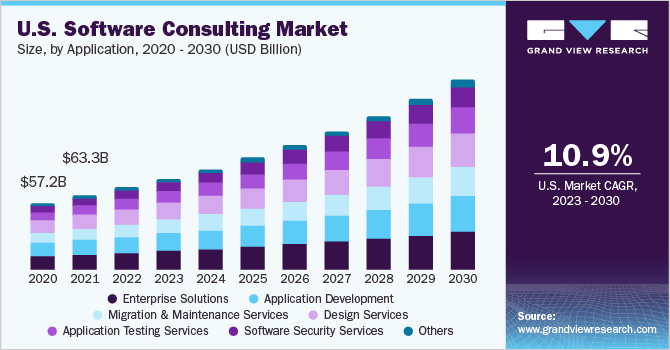- Software consultants usually carry out responsibilities that include code audits to detect performance problems and vulnerability assessments to identify security flaws.
- The most important factor to consider when choosing a software consultant for your project is technical expertise, which includes proficiency in coding, software architecture, and associated development tools and languages.
Key Takeaways
Are you facing challenges like slow software development, budget overruns, or compatibility issues with third-party tools? Or are you looking to have a systematic approach to project planning? You can effectively address these challenges with a software consultant.
Software consultants are the problem-solving experts for your software projects. The demand for software consultants is increasing day by day. As per the reports of Grand View Research, the global software consulting industry is estimated to develop at a compound annual growth rate (CAGR) of 12.1% from 2023 to 2030.
Choosing the right development partner who offers end to end custom software development services can streamline the development process and guide businesses in implementing strategies that align with their specific goals and requirements.
Check out the report on the annual growth rate of software consultants.

Let’s help you get the answer to your question – what does a software consultant do?
Table of Contents
- What Does a Software Consultant Do?
- The Roles and Responsibilities of a Software Consultant
- 9 Essential Skills for Software Consultants
- How to Choose the Right Software Consultant in 6 Steps
- 5 Benefits of Having a Software Consultant for Your Project
- FAQs About Software Consultants
- Hire the Best Software Consultant for Your Business
What Does a Software Consultant Do?
A software consultant is an expert who provides advice and direction in the field of software development and technology to businesses or individuals. Here are some of the most common activities associated with a software consultant:
- Analyze the current systems, infrastructure, and procedures of a customer to discover areas for enhancement or optimization.
- Assess and analyze various technologies, platforms, and the software development process to identify the best match for a given project.
- Help with project planning by identifying the goals, the scope, the deadlines, and the resources needed.
- Guide the client through the software solution implementation process, ensuring effective integration, configuration, and deployment.
- Provide training and knowledge transfer sessions to the client’s team to use and maintain the software successfully.
- Address issues that might arise during or after the implementation phase, trying to find and implement solutions.
Now, let’s dive into the software consultant roles and responsibilities to understand their importance in driving successful projects.
The Roles and Responsibilities of a Software Consultant
The role of a software consultant is crucial in helping clients make better decisions regarding technology which is a core part of software consulting. To gain more understanding of software consulting, you can check out our article with definition of software consulting. This will help you understand the benefits of software consulting and process.
Here are the roles and responsibilities of a software consultant.
Conduct a Thorough Assessment
- Understand the objectives and requirements of the client.
- Evaluate existing software systems, highlight pain areas, and evaluate the current technological environment.
Evaluate and Recommend Technology Solutions
- Maintain up-to-date knowledge of emerging technologies and evaluate their suitability for each project.
- Give recommendations for the most suitable technology stack to use to achieve the project’s objectives.
Plan and Expertly Manage Software Projects
- Create detailed project plans that specify tasks, time frames, and allocation of resources.
- Supervise project execution to ensure that targets are reached and resources are used efficiently.
Proactively Resolve Technical Challenges
- Utilize soft skills like problem-solving to deal with technical concerns in an innovative and efficient manner.
- Troubleshoot problems, eliminate flaws, as well as enhance software system performance.
Maintain Transparent Client Communication
- Maintain effective communication with clients throughout the project’s lifecycle.
- Update clients frequently on project status and involve clients in decision-making.
- Respond to client complaints as soon as possible and maintain transparency.
Collaborate Effectively with Cross-functional Teams
- Collaborate productively with cross-functional teams that include junior and senior developers, designers, and project managers.
- Encourage teamwork to maintain a positive project environment.
Skillfully Manage Risk and Uncertainty
- Figure out and minimize the risks by identifying potential challenges and developing risk reduction approaches.
- Adapt to unexpected challenges to keep projects on track.
Ensure Stringent Quality Assurance
- Conduct extensive testing and quality assurance procedures in order to create high-quality software.
- Debug the software thoroughly to ensure it fulfills specific quality standards.
Adapt Strategically to Changing Requirements
- Actively modify strategies and plans in response to altering project requirements.
- Maintain adaptability and responsiveness to ever-shifting client needs.
Maintain Comprehensive Documentation
- Keep complete documentation of all necessary processes, code, and project-related information to ensure transparency purposes and future use.
Need a Software Consultant to Overcome Tech Challenges?
Contact us for expert technical advice and strategy implementation tailored to your project’s needs, drawing from our experience with over 1200 global clients.

Now that you know the complete software consultant role, let’s discuss the skills that are important for software consultants.
9 Essential Skills for Software Consultants
Here is the table containing the essential software consultant skills.
| Skill | Description |
|---|---|
| Technical Proficiency | A deep understanding of coding, computer software architecture, and various development tools and languages. |
| Analytical Skills | The ability to break down difficult situations into smaller parts and find solutions. |
| Problem-solving | Creative problem-solving skills to address technical and non-technical challenges effectively. |
| Communication Skills | Strong communication, both verbal and written, for clear interaction with clients, the development team and other team members. |
| Project Management | Organizational skills and the ability to manage project timelines, tasks, and resources which helps in improving business operations. |
| Teamwork | Collaborative mindset for working effectively with multidisciplinary teams. |
| Negotiation and Conflict Resolution | Skills to resolve conflicts, negotiate with stakeholders, and find win-win software solutions. |
| Presentation Skills | Ability to present ideas, solutions, and project progress effectively to clients and colleagues. |
| Risk Management | Identifying and mitigating project risks to ensure smooth project execution. |
Now, you have a clear idea about the skills required for a software consultant. So, let’s discuss the process of choosing the right software consultant.
How to Choose the Right Software Consultant in 6 Steps
Here are the steps involved in choosing the right software consultant.
Define Your Needs Clearly
Before you begin looking for the right software consultant that suits your requirements, you must first understand the specifications of your project. These specifications involve:
- Clearly outline the software project’s purposes and objectives.
- Determine the project’s financial limitations and available budget.
- Create project schedules that include essential milestones and deadlines.
- Specify the core functions and features that the software must have.
- Decide which technologies, languages, and frameworks are appropriate or required.
Make the description of your software project precise and detailed to ensure that potential consultants understand what you want.
Research Potential Consultants Thoroughly
In this step, you need to begin your search for software consultants. There are various sources available in the market where you can find candidates that suit your requirements. These sources include online platforms, recommendations from colleagues, and industry groups. You should look for experts with suitable portfolios or other professionals with experience in your industry and knowledge of the technologies you wish to use.
Check Technical Certificates and Qualifications
Once you have a list of qualified candidates as a result of your research, you must now evaluate the technical certificates and qualifications of the candidates. Here are the points you need to consider during the evaluation process.
- Examine the candidate’s portfolio and past projects. Check out projects that are similar to yours in terms of difficulty and scope.
- Confirm that candidates know the programming languages, frameworks, and tools that will be used in your project.
- Check out the testimonies, ratings, and reviews posted online by previous clients.
- Assess the candidate’s credentials to see if they hold the necessary software development certifications.
Contact Client References
Connecting with former clients is one of the best and most effective ways to assess a software consultant’s abilities. Contact the consultant and request references. Inquire about their experience with the consultant while chatting with references. Here are some particular questions to ask:
- Did the consultant effectively fulfill project deadlines?
- How effectively did the software consultant communicate project progress and issues?
- Were there any unexpected challenges, and if so, how did the consultant address them?
- Did the consultant’s work align with the primary project specifications and requirements?
- Were there any budget overruns or unexpected charges?
These questions will provide you with a better understanding of the consultant’s performance and how the consultant deals with project challenges.
Ensure Transparency and Proper Documentation
When it comes to consulting partnerships, the most important thing is to have open communication. Ensure that the consultant offers you a full proposal and project plan. Milestones, deliverables, deadlines, and cost estimates all should be included in this plan. Also, you need to talk about how the consultant handles project documentation including specifications, design, and code documentation.
Negotiate and Finalize the Consulting Contract
The last but not least step is to negotiate the terms of the consulting contract. Check out the important points you need to consider while carrying out this phase.
- Define the project scope clearly, covering deliverables and objectives.
- Decide on the payment structure, this must include upfront fees, milestone payments, or hourly rates.
- Create realistic project timeframes and consider how to handle delays or scope modifications.
- Specify who owns the intellectual property rights to the project’s software.
- Ensure that the consultant promises to keep sensitive project information confidential.
Want to Get Guidance for Your Project?
Having 14+ years of experience, our consultants are experts at guiding you through a simple and well-organized process.
If you are still confused then you might want to take a look the curated list of top software consulting companies in the USA.
Let’s discuss the benefits of having a consultant for your software project.
5 Benefits of Having a Software Consultant for Your Project
Here are the 5 core benefits of having a software consultant for your project.
Access to Specialized Expertise and Guidance
Software consultants have knowledge of coding languages, frameworks, and development techniques. These experts help you make well-informed decisions by offering insights into the most recent industry trends and best practices.
Cost-effective Solutions Tailored to Your Budget
Software consultants evaluate the budget restrictions of your project and propose cost-effective alternatives. These professionals support the optimal allocation of resources, which guarantees your project stays under budget without sacrificing quality.
Enhanced Project Efficiency and Timely Delivery
Software consultants improve project workflows, shorten development cycles and ensure the timely fulfillment of milestones. This increased efficiency keeps your project on pace to be completed on time.
Customized Solutions Aligned with Your Unique Requirements
Consultants collaborate with you to fully comprehend your company operations and goals for the project. These professionals develop customized software solutions that properly fit your specific needs, ensuring optimal functionality.
Proactive Risk Management and Issue Resolution
Software consultants analyze potential risks associated with the project and propose mitigation approaches. These experts excel in quickly resolving problems, minimizing disruptions, and ensuring the project’s progress is uninterrupted.
Now, you have a clear idea about the benefits. If you still have questions about software consultants, check out the FAQ section.
Frequently Asked Questions About Software Consultants
What are common challenges faced by software consultants?
Here are the common challenges faced by software consultants.
- Unable to verify that the project stays within the established scope as clients constantly request adjustments or additions that affect the project’s schedule and budget.
- Failure to manage and match client expectations with project realities, as well as confusion or unrealistic expectations regarding timeframes, prices, or deliverables, all contribute to project dissatisfaction.
- Difficulty in dealing with complicated technical issues and finding effective solutions, particularly in projects involving cutting-edge technologies or intricate architecture.
- Lack of effective leadership and communication abilities makes it difficult to manage a development team, especially in distant or distributed environments.
- Inability to identify and mitigate project risks such as security vulnerabilities.
What is the salary of the software consultant?
The average salary of a software consultant is around $80,000 to $198,000 per year.
This is just an average software consultant salary estimated from reliable sources like salary.com and Indeed. The exact salary of a software consultant depends on several factors. These factors include the level of experience which covers from an entry-level software consultant to an experienced consultant, expertise in particular technologies or industries, geographical regions, complexity of the project, and educational qualifications of the software consultant.
How do software consultants differ from software developers?
Software development consultants specialize in providing strategic direction and project management, which helps clients to be decision-makers and coordinate software projects with business objectives. Instead of writing code, these experts concentrate on planning and consulting.
On the opposite hand, software developers are experienced software professionals who are in charge of developing and maintaining software applications that solve business problems. Convert business needs into functioning software, with a focus on technical execution. These experts ensure the provision of successful software with maximum efficiency.
Hire the Best Software Consultant for Your Business
Software consultants play an essential role in creating software development solutions . From conducting a detailed assessment of the needs to proactively resolving technical difficulties, software consultants ensure the projects are completed promptly and successfully.
In-depth knowledge of your project’s requirements, extensive research, verification of credentials, and maintaining transparency are important when selecting a great software consultant for your project.
Space-O Technologies, as a leading software development company, provides software consulting services for your project. Book your free call and we understand your needs, create a strategy, and present a plan. With 14+ years of experience, we have validated more than 300 software solutions. Contact us to get valuable guidance for your business.



